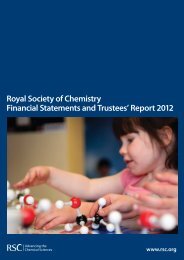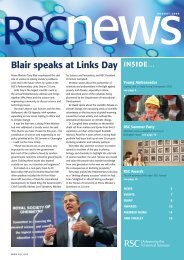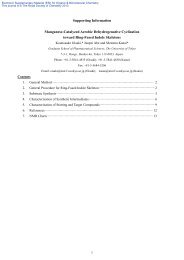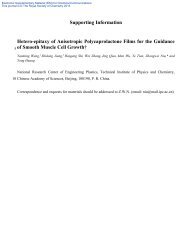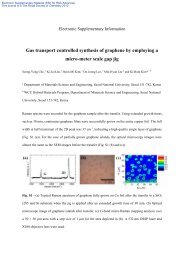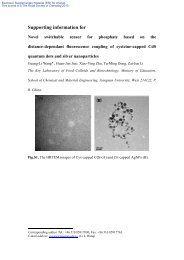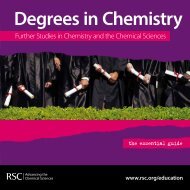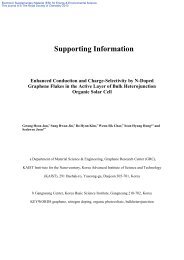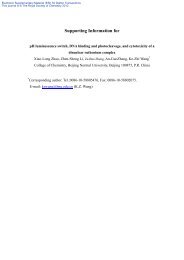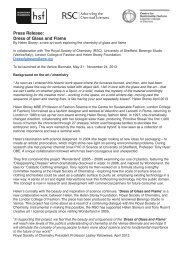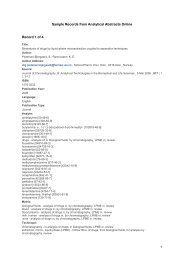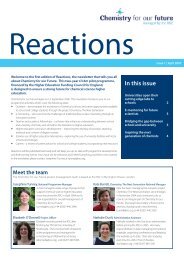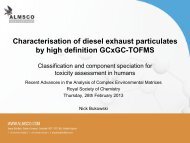macro group uk polymer physics group bulletin - Royal Society of ...
macro group uk polymer physics group bulletin - Royal Society of ...
macro group uk polymer physics group bulletin - Royal Society of ...
You also want an ePaper? Increase the reach of your titles
YUMPU automatically turns print PDFs into web optimized ePapers that Google loves.
Macro Group UK & Polymer Physics Group Bulletin No 71 January 2009 Number Page71<br />
1<br />
M ACRO GROUP UK<br />
P OLYMER P HYSICS G ROUP<br />
BULLETIN<br />
January 2009<br />
I N S I D E T H I S I S S U E :<br />
Editorial<br />
Views from the Top 2<br />
PPG & MGUK Committee members 3<br />
PPG and MacroGroup News 4<br />
MacroGroup UK Awards 8<br />
Conference Reports 10<br />
Bursaries 15<br />
Forthcoming Meetings 16<br />
Teaching and Learning Resources 20<br />
MGUK committee Nominations 21<br />
Contributions for inclusion in the BULLETIN<br />
should be emailed (preferably) or sent to<br />
either:<br />
Dr Andrew Dove (MG UK),<br />
Department <strong>of</strong> Chemistry<br />
University <strong>of</strong> Warwick,<br />
Coventry, CV4 7AL<br />
a.p.dove@warwick.ac.<strong>uk</strong><br />
Tel: (024) 7652 4107<br />
Welcome to the January 2009 PPG and MGUK <strong>bulletin</strong>.<br />
We would like to wish all our readers a happy new year and<br />
all the best for 2009.<br />
This issue brings news <strong>of</strong> the recipients <strong>of</strong> the MGUK<br />
medal, outstanding achievement medal and the young<br />
researchers medal for 2008. The winner <strong>of</strong> the 2009 PPG<br />
Founders prize is also announced.<br />
We are also pleased to report the award <strong>of</strong> a major EPSRC<br />
platform grant to researchers at the University <strong>of</strong> Reading.<br />
Details are also given for a number <strong>of</strong> forthcoming<br />
conferences including the PPG biennial meeting to be held<br />
in Bristol in September and the ’Biological and S<strong>of</strong>t Matter’<br />
meeting to be held in Warwick in April.<br />
James Sharp<br />
Andrew Dove<br />
Bulletin Officers<br />
Or<br />
Dr James Sharp (PPG)<br />
School <strong>of</strong> Physics and Astronomy<br />
University <strong>of</strong> Nottingham<br />
University Park<br />
Nottingham, NG7 2RD<br />
james.sharp@nottingham.ac.<strong>uk</strong><br />
Tel: (0115) 951 5142<br />
The Pure and Applied Macromolecular Chemistry Group<br />
(Macro Group UK) is a joint <strong>group</strong> <strong>of</strong> the <strong>Royal</strong> <strong>Society</strong> <strong>of</strong> Chemistry and the <strong>Society</strong><br />
<strong>of</strong> Chemical Industry.<br />
The Polymer Physics Group is a joint <strong>group</strong> <strong>of</strong> the Institute <strong>of</strong> Physics and the<br />
<strong>Royal</strong> <strong>Society</strong> <strong>of</strong> Chemistry.<br />
The deadline for contributions for the next<br />
issue is<br />
30 June 2009.
Macro Group UK & Polymer Physics Group Bulletin No 71 January 2009 Page 2<br />
Views from the Top<br />
From the Chairman <strong>of</strong><br />
Macro Group<br />
We are pleased to announce our 2008 Medal winners in this<br />
<strong>bulletin</strong> and a one day meeting celebrating their success will<br />
take place in Sheffield on 21st July 2009 in Sheffield organised<br />
by Patrick Fairclough. This will be run in conjunction with the<br />
Young Researchers meeting on the following day and we hope<br />
you will all be able to join us.<br />
The Macro Group is continuing to be working hard to develop<br />
the 2010 IUPAC World Polymer Congress in Glasgow between<br />
July 11th and 16th . This is the 43rd IUPAC World Polymer<br />
Congress, 'Macro2010', is the latest in the series <strong>of</strong> the biennial<br />
meetings <strong>of</strong> the IUPAC Polymer Division. The series has been<br />
running for several decades and is the largest international<br />
multi-symposium conference dedicated to all aspects <strong>of</strong> <strong>polymer</strong><br />
science and engineering.<br />
Macro2010 is organised by the <strong>Royal</strong> <strong>Society</strong> <strong>of</strong> Chemistry<br />
(RSC) and hosted by the Pure and Applied Macromolecular<br />
Chemistry Group (Macro Group UK), a joint interest <strong>group</strong> <strong>of</strong><br />
the RSC and the <strong>Society</strong> <strong>of</strong> Chemical Industry (SCI).<br />
Confirmed plenary speakers include:<br />
Pr<strong>of</strong>essor Jean M J Fréchet (University <strong>of</strong> California, Berkeley,<br />
USA)<br />
Pr<strong>of</strong>essor Sir Richard Friend, FRS (University <strong>of</strong> Cambridge,<br />
UK)<br />
Pr<strong>of</strong>essor Ming Jiang (Fudan University, China)<br />
Pr<strong>of</strong>essor Laura Kiessling (University <strong>of</strong> Wisconsin-Madison,<br />
USA)<br />
Pr<strong>of</strong>essor Kiyohito Koyama (Yamagata University, Japan)<br />
Pr<strong>of</strong>essor Ludwik Leibler (ESPCI CNRS, Paris, France)<br />
Please plan to attend this important meeting for UK Polymer<br />
Science.<br />
Best wishes for 2009<br />
Dave Haddleton<br />
Chairman<br />
Macro Group<br />
Thoughts from the<br />
PPG Chair<br />
Conferences big and small<br />
Scientific meetings come in all sizes – from intimate gatherings<br />
<strong>of</strong> a few tens <strong>of</strong> people to gigantic international behemoths<br />
where thousands <strong>of</strong> delegates take over an<br />
unlucky host city for a week or so. Big conferences and<br />
small conferences each have their roles, but they serve<br />
their scientific communities in different ways. Our community<br />
<strong>of</strong> UK <strong>polymer</strong> physicists has a number <strong>of</strong> conferences,<br />
big and small, coming up in the UK in the next year or two,<br />
and each <strong>of</strong> these has its own significance to us.<br />
For the Polymer Physics Group itself, our biennial meeting<br />
is the central event for defining the <strong>group</strong> and its activities.<br />
This year’s biennial - “Physical Aspects <strong>of</strong> Polymer Science”,<br />
takes place this year in Bristol from 14 – 16 September;<br />
it’s a time when we see the exciting work being<br />
done by our members, particularly those early in their career.<br />
We honour the many contributions to our community<br />
by our Founders’ Prize winner, Athene Donald, and we<br />
learn from distinguished guest speakers. This is the meeting<br />
<strong>of</strong> our national community, where it defines and renews<br />
itself.<br />
But <strong>polymer</strong> <strong>physics</strong> doesn’t exist in a vacuum, and the UK<br />
is just one <strong>of</strong> the many countries where excellent science<br />
is being done. Another meeting coming this spring brings<br />
our interests as <strong>polymer</strong> physicists together with those in<br />
closely related fields, studying all kinds <strong>of</strong> complex fluids<br />
and biological systems. “Biological Physics and S<strong>of</strong>t Matter”<br />
takes place at Warwick from April 6 – April 8 this year;<br />
it has been jointly organised by PPG with our colleagues in<br />
the Liquids and Complex Fluids Group and the recently<br />
established Biological Physics Group. This marks an important<br />
step in our efforts to build up a larger community <strong>of</strong><br />
like-minded physicists, interested in all kinds <strong>of</strong> s<strong>of</strong>t matter,<br />
within the Institute <strong>of</strong> Physics.<br />
Worldwide <strong>polymer</strong> science – taking in <strong>polymer</strong> chemistry,<br />
<strong>polymer</strong> <strong>physics</strong> and the many applications <strong>of</strong> <strong>polymer</strong>s in<br />
areas as different as electronics and healthcare – is an<br />
even wider community. In 2010 the <strong>polymer</strong> world is coming<br />
to us; the 43rd IUPAC World Polymer Congress,<br />
“Macro2010” takes place in Glasgow from 11-16 July<br />
2010, attracting 1500 – 2000 scientists. The theme <strong>of</strong><br />
this meeting is “Polymer science in the service <strong>of</strong> society”-<br />
and this should remind us <strong>of</strong> the wider relevance <strong>of</strong> our<br />
subject in contributing to the new technologies that no-one<br />
can doubt the whole world needs in difficult times.<br />
Richard Jones<br />
Chairman<br />
Polymer Physics Group
Macro Group UK & Polymer Physics Group Bulletin No 71 January 2009 Page 3<br />
PPG & Macro Group Committees<br />
PPG Committee 2007-2009<br />
Macro Group Committee<br />
Chair:<br />
Pr<strong>of</strong>essor Richard Jones<br />
Vice-Chair:<br />
Dr. Simon Hanna<br />
Honorary Secretary and Treasurer:<br />
Dr. Nigel Clarke<br />
Ordinary members:<br />
Dr. Thomas Waigh<br />
Dr. Michael Butler<br />
Dr. Mike Jenkins<br />
Dr. Roy Christopherson<br />
Dr. Sally Organ<br />
Dr. Ian Robinson<br />
Dr. Joseph Keddie<br />
Dr. João Cabral<br />
Dr. Alex Routh<br />
Dr. James Sharp (Bulletin Officer)<br />
Dr. Daniel Read<br />
Chairman: Pr<strong>of</strong>. David Haddleton (University <strong>of</strong> Warwick) 2007 - 2010<br />
Secretary: Dr Joachim Steinke (Imperial College) 2008 - 2009<br />
Treasurer: Pr<strong>of</strong>. Stephen Yeates (University <strong>of</strong> Manchester) 2005 - 2009<br />
Ordinary Members:<br />
Dr Peter Cormack (University <strong>of</strong> Strathclyde), Membership Officer 2005 - 2009<br />
Dr Carl Waterson (Infineum International), Meetings Programme Officer 2006 - 2009<br />
Dr Neal Williams (ICI Paints) 2006 - 2009<br />
Dr Raj Bhardwaj (Polymer Laboratories) 2007 - 2010<br />
Pr<strong>of</strong>. Steve Brocchini (London University) 2007 - 2010<br />
Dr Andrew Dove (University <strong>of</strong> Warwick), Bulletin Officer 2007 - 2010<br />
Pr<strong>of</strong>. Steve Howdle (University <strong>of</strong> Nottingham) 2007 - 2010<br />
Dr Andrew Lewis (Biocompatibles) 2007 - 2010<br />
Dr Christopher Sammon (Sheffield Hallam University), Web Site Officer 2007 - 2010<br />
Dr Sharon Cooper (Durham University) 2008 - 2011<br />
Pr<strong>of</strong>essor Ian Manners (University <strong>of</strong> Bristol) 2008 - 2011<br />
Dr Ezat Koshdel (Unilever) 2008 - 2011<br />
Pr<strong>of</strong>essor Ian Hamley (University <strong>of</strong> Reading) EPF Liason 2008 - 2011<br />
Co-opted Member:<br />
Dr Fred Davies (University <strong>of</strong> Reading), Polymer Roadshow Officer<br />
Representative Members:<br />
Representing <strong>Society</strong> <strong>of</strong> Chemical Industry:<br />
Pr<strong>of</strong>. Richard Jones (University <strong>of</strong> Kent)<br />
Representing Colloid & Interface Science Groups, RSC and SCI:<br />
Pr<strong>of</strong>. Peter Williams (NEWI)<br />
Representing Materials Chemistry Forum, RSC:<br />
Pr<strong>of</strong>. Stephen Yeates (University <strong>of</strong> Manchester)<br />
Representing Polymer Physics Group, IoP:<br />
Dr Nigel Clarke (Durham University)<br />
Representing Biomaterials Chemistry Group, RSC:<br />
Dr Aline Miller (University <strong>of</strong> Manchester)<br />
Representing Institute <strong>of</strong> Materials, Minerals and Mining:<br />
vacant<br />
Representing European Polymer Federation:<br />
Dr Wayne Hayes (University <strong>of</strong> Reading)<br />
Representing Polymer Degradation Discussion Group:<br />
Dr Michelle Edge (Manchester Metropolitan University)<br />
Representing Polymer Colloids Forum:<br />
Pr<strong>of</strong>. Peter Lovell (University <strong>of</strong> Manchester)<br />
Representing RAPS Network:<br />
Dr Rachel O’Reilly (University <strong>of</strong> Cambridge)<br />
Career Break Grants<br />
The Institute’s Career Break Grants help members to stay in touch with the wider <strong>physics</strong> community.<br />
Contributions towards attendance and associated costs are available.<br />
Members can apply by going to http://www.iop.org/activity/academia/Career_Break_Grants/page_5466.html<br />
or by emailing cbg@iop.org<br />
Career Break Rates for Conferences<br />
Members can attend all Institute <strong>of</strong> Physics conferences at a reduced rate.<br />
Reduced Membership Subscription Rates<br />
Members on a career break are entitled to a reduced membership subscription rate, which is currently just £10.<br />
Email membership.iop.org, including your membership ID number in the text, to qualify for this rate.
Macro Group UK & Polymer Physics Group Bulletin No 71 January 2009 Page 4<br />
PPG and MacroGroup News<br />
The IOP Research Student<br />
Conference Fund<br />
The IOP has recently introduced a new scheme for contributing<br />
towards the cost <strong>of</strong> PhD students attending<br />
international and major national conferences.<br />
If you a PhD student and a member <strong>of</strong> the IOP, you are<br />
entitled to apply for up to £250 conference support.<br />
You may apply more than once, so you may either request<br />
the full amount or decide to request a smaller<br />
amount and then apply for funding again for another<br />
conference at a later stage.<br />
Grants will normally cover only part <strong>of</strong> the expenses<br />
incurred in attending a conference and are intended to<br />
supplement grants from other sources. Applications are<br />
now made direct to the IOP, rather than through <strong>group</strong>s,<br />
as has been the case in the past. Applications will be<br />
considered on a quarterly basis and should reach the<br />
Institute by: 1st March, 1st June, 1st September or 1st<br />
December <strong>of</strong> each calendar year.<br />
A decision will be made within eight weeks <strong>of</strong> the closing<br />
date, so the deadline chosen should be at least<br />
three months before the event that you wish to attend.<br />
In return for the financial support you will be asked to<br />
write a short conference report, which will appear in this<br />
newsletter.<br />
The only other condition is that if you wish to apply for<br />
support for a <strong>polymer</strong> <strong>physics</strong> related conference you<br />
must also be a member <strong>of</strong> the Polymer Physics Group!<br />
Further details and an application form can be found at,<br />
http://www.iop.org/activity/grants/<br />
Research_Student_Conference_Fund/<br />
page_26535.html<br />
Those <strong>of</strong> you who are EPSRC funded, but not members<br />
<strong>of</strong> the IOP, are entitled to join the IOP for FREE! Details<br />
can be found at,<br />
http://www.epsrc.ac.<strong>uk</strong>/PostgraduateTraining/<br />
InformationForStudents/FreeMembership.htm<br />
Polymer Physics Group<br />
Prize for the Best<br />
Student Publication<br />
The Polymer Physics Group (PPG) is pleased to announce<br />
that applications are being accepted for a prize to recognise<br />
the most outstanding publication by a PhD student<br />
on a subject within PPG’s remit. The prize winner will<br />
receive a monetary award and will also be invited to present<br />
a lecture at the Polymer Physics Group Biennial<br />
Meeting on 14-16 th September 2009.<br />
Criteria for the award<br />
The prize will be awarded<br />
for the best publication in<br />
a journal on a topic <strong>of</strong><br />
relevance to <strong>polymer</strong><br />
<strong>physics</strong> (as judged by the<br />
awards committee). The<br />
scientific quality, originality<br />
and significance <strong>of</strong> the<br />
research will be considered.<br />
The applicant must<br />
be an author or co-author<br />
<strong>of</strong> the publication. The<br />
research reported in the publication must have been<br />
carried out as part <strong>of</strong> the PhD research <strong>of</strong> the applicant.<br />
The publication must be publicly available, either on a<br />
journal website or in printed format and the date <strong>of</strong> publication<br />
(as stated by the journal) must be after the 30th<br />
April, 2007. Manuscripts in preparation or under review<br />
will not be considered for the prize.<br />
Application Procedure<br />
The application for the prize will consist <strong>of</strong> three items:<br />
(1) A paper or electronic copy <strong>of</strong> the publication in a<br />
journal.<br />
(2) A signed letter (on University letterhead) from<br />
the supervisor <strong>of</strong> the PhD student confirming<br />
that the research was carried out by the applicant<br />
as part <strong>of</strong> PhD research.<br />
(3) A statement from the applicant outlining the<br />
significance <strong>of</strong> the publication.<br />
The application should be submitted to;<br />
Dr Nigel Clarke, Department <strong>of</strong> Chemistry, University Science<br />
Laboratories, South Road, Durham DH1 3LE.<br />
E-mail: nigel.clarke@durham.ac.<strong>uk</strong><br />
Mr Tao Wang (Uni. <strong>of</strong><br />
Surrey), recipient <strong>of</strong> the<br />
Applications must be received by 30 April, 2009
Macro Group UK & Polymer Physics Group Bulletin No 71 January 2009 Page 5<br />
PPG and MacroGroup News<br />
Athene Donald to be Awarded the 2009 PPG<br />
Founders’ Prize<br />
The Polymer Physics Group Founders' Prize, instigated to commemorate the work <strong>of</strong> Pr<strong>of</strong>essor Andrew Keller, is<br />
awarded biennially to a scientist who has made an outstanding contribution to Polymer Physics in the UK or Ireland.<br />
We are delighted to announce that the 2009 winner is Athene Donald. The award <strong>of</strong> the prize will be one <strong>of</strong> the highlights<br />
<strong>of</strong> the <strong>group</strong>'s biennial meeting in Bristol (see page 16 for further details).<br />
Pr<strong>of</strong>essor Donald began her career as an electron microscopist,<br />
with a PhD from the Cavendish Laboratory in Cambridge in<br />
1977. Initially trained as a metal physicist, she began work on<br />
<strong>polymer</strong>s during postdoctoral research at Cornell University. This<br />
resulted in a series <strong>of</strong> seminal papers elucidating the molecular<br />
basis <strong>of</strong> crazing, a common failure mode in glassy <strong>polymer</strong>s.<br />
Having moved back to the UK to research fellowships at Cambridge,<br />
first in the Materials Science Department, and then the<br />
Cavendish Laboratory, she made major contributions to the field<br />
<strong>of</strong> liquid crystal <strong>polymer</strong>s, summarised in a book co-authored<br />
with Alan Windle. At the Cavendish, she became interested in<br />
food bio<strong>polymer</strong>s, and was one <strong>of</strong> the pioneers in finding a<br />
sound physical basis for food science in the <strong>physics</strong> <strong>of</strong> bio<strong>polymer</strong>s,<br />
using techniques such as small angle x-ray scattering to<br />
study starch. At this time she also pioneered the quantitative<br />
use <strong>of</strong> the environmental scanning electron microscope in s<strong>of</strong>t<br />
matter systems. Most recently she has made important contributions<br />
to the study <strong>of</strong> the misfolding and aggregation <strong>of</strong> proteins,<br />
discovering for the first time the importance <strong>of</strong> spherulitic growth<br />
in the growth <strong>of</strong> aggregates <strong>of</strong> amyloid fibrils.<br />
The importance <strong>of</strong> her work has been recognised by many honours,<br />
including the IoP's CV Boys prize (1989), election to the<br />
<strong>Royal</strong> <strong>Society</strong> in 1999, the IoP's Mott Medal (2005) and the<br />
L’ORÉAL-UNESCO Award For Women in Science (2009). Through<br />
these honours she has raised the pr<strong>of</strong>ile <strong>of</strong> <strong>polymer</strong> <strong>physics</strong> in<br />
Pr<strong>of</strong>. Athene Donald (Cavendish Laboratory,<br />
Cambridge) pictured above will be awarded<br />
the 2009 PPG Founder’s Prize<br />
the UK, both in the mainstream <strong>physics</strong> community, but also, by virtue <strong>of</strong> her very wide- ranging interests, in many<br />
other communities, including food science, plant biology, molecular biology and colloid science. She has also given<br />
generously her time and efforts to the Polymer Physics community, as a long-standing member <strong>of</strong> the PPG committee<br />
from 2001 to 2007, and through service to many other committees, for example for EPSRC and BBSRC and most<br />
recently as a member <strong>of</strong> the current RAE Physics Panel. Through these efforts the importance <strong>of</strong> <strong>polymer</strong> <strong>physics</strong> in a<br />
wide range <strong>of</strong> disciplines and applications well outside its traditional core interests has become widely appreciated,<br />
to the great benefit <strong>of</strong> the field in the UK. Her work as founding chair <strong>of</strong> the IoP's new Biological Physics <strong>group</strong> will<br />
ensure that the broader importance <strong>of</strong> Polymer Physics as one <strong>of</strong> the foundations <strong>of</strong> the wider area <strong>of</strong> s<strong>of</strong>t matter<br />
<strong>physics</strong> is widely appreciated.<br />
In summary, Pr<strong>of</strong>essor Donald has made an outstanding contribution to Polymer Physics in the UK, both through the<br />
wide impact <strong>of</strong> her own research, and through her tireless efforts on behalf <strong>of</strong> the wider <strong>polymer</strong> <strong>physics</strong> community.<br />
PPG Committee
Macro Group UK & Polymer Physics Group Bulletin No 71 January 2009 Page 6<br />
PLATFORM GRANT SUCCESS<br />
PPG and MacroGroup News<br />
Polymer scientists at the University <strong>of</strong> Reading (Pr<strong>of</strong>essors Colquhoun, Hamley and Matsen,<br />
and Dr Hayes) have recently been awarded a prestigious Platform Grant by EPSRC (the UK Engineering<br />
& Physical Sciences Research Council). This research grant is valued at over £1M and<br />
will run for 5 years.<br />
The grant provides a platform for ongoing research programmes on a wide range <strong>of</strong> advanced<br />
<strong>polymer</strong>ic materials, with applications in fuel cells for the hydrogen economy, self-repairing materials,<br />
water purification, and healthcare – with particular relevance to protein-misfolding diseases<br />
such as Alzheimer’s. The team will also work on the development <strong>of</strong> information transfer in <strong>polymer</strong>s<br />
and self-healing materials that can, without external input, repair damage in their surfaces.<br />
The core theme <strong>of</strong> the research is the design <strong>of</strong> new <strong>polymer</strong>ic materials with specified structures<br />
on the nanometre length scale (1 nanometre ≈1/1000 <strong>of</strong> the width <strong>of</strong> a human hair). Structuring<br />
on this length scale gives materials with entirely new properties.<br />
A team <strong>of</strong> four experienced postdoctoral researchers will be supported by the new grant. They<br />
will design and synthesize new <strong>polymer</strong>s, characterise their properties and applications, and<br />
carry out computational studies to explain and predict the behaviour <strong>of</strong> new, nanostructured materials.<br />
Exciting discoveries are expected which could lead to low-cost drinking water for the developing<br />
world, improved fuel cells for clean/renewable energy, new structural materials and adhesives,<br />
and novel therapies for protein-based diseases.<br />
The University <strong>of</strong> Reading is a leading research-intensive University (one <strong>of</strong> the top 200 in the<br />
World), and has been a major centre for <strong>polymer</strong> science for more than thirty years.<br />
Investigators and Postdocs: Back row: Mark Matsen, Barny Greenland, Ian Hamley, inset: Wayne Hayes<br />
Front row: Howard Colquhoun, Valeria Castelletto, Zhixue Zhu, Jaeup Kim
Macro Group UK & Polymer Physics Group Bulletin No 71 January 2009 Page 7<br />
PPG and MacroGroup News<br />
The Knowledge Centre for Materials Chemistry<br />
The Knowledge Centre in Materials Chemistry (KCMC) based on the world class research institutes in the northwest will be<br />
established in 2009 to achieve innovative knowledge transfer into industry. This will initially be in the northwest, then the rest <strong>of</strong><br />
the UK and finally overseas.<br />
Research has clearly indicated that at least half <strong>of</strong> the companies in the chemistry using sector rely in some way on materials<br />
chemistry. This Centre will interact directly with these companies and will enable the leading materials chemistry research centres<br />
in the Northwest to coordinate, develop and exploit their capabilities in order to drive significant industrial growth in the<br />
northwest and the UK.<br />
The Centre will comprise leading edge capabilities in materials chemistry at the universities <strong>of</strong> Bolton, Liverpool and Manchester,<br />
and the Science & Technology Facilities Council at Daresbury.<br />
The Centre will be managed by an independent Knowledge Transfer Team hosted by the Chemistry Innovation KTN whose role<br />
will be to develop and manage the industrial and HEI collaborative research activity, increase industrial R&D spend and support<br />
the chemicals industry both in the region and the wider UK. The overall aim <strong>of</strong> the Centre is to facilitate a step change in the performance<br />
<strong>of</strong> the chemicals sector through combining the excellent research capabilities across the Northwest thus providing the<br />
region with a truly internationally renowned capability in materials chemistry that will attract ongoing investment both from the<br />
UK and overseas.<br />
The Centre will be managed by an independent Knowledge Transfer Team hosted by the Chemistry Innovation KTN whose role<br />
will be to develop and manage the industrial and HEI collaborative research activity, increase industrial R&D spend and support<br />
the chemicals industry both in the region and the wider UK. The overall aim <strong>of</strong> the Centre is to facilitate a step change in the performance<br />
<strong>of</strong> the chemicals sector through combining the excellent research capabilities across the Northwest thus providing the<br />
region with a truly internationally renowned capability in materials chemistry that will attract ongoing investment both from the<br />
UK and overseas.<br />
The Knowledge Centre will be formally launched in the first quarter <strong>of</strong> 2009 and will build up its collaborative projects with<br />
industry during 2009 and beyond. Funding has been provided by the NWDA to start the Centre and to underpin the main knowledge<br />
transfer activities <strong>of</strong> the Centre during the first three years <strong>of</strong> its operation.<br />
The objectives <strong>of</strong> the Centre are:<br />
• To provide a multi-disciplinary research and knowledge transfer facility for small, medium and large companies, initially<br />
within the Northwest but nationally and internationally within three to five years.<br />
• In collaboration with industry to develop and execute research and development programmes to meet the medium term<br />
research needs <strong>of</strong> chemistry using industries.<br />
• To exploit the Northwest’s world class science base in materials chemistry for the benefit <strong>of</strong> the regional economy by attracting<br />
investment in the region from the UK and overseas.<br />
• To achieve collaboration and synergy between the Northwest’s different centres <strong>of</strong> expertise in materials chemistry.<br />
• To develop the technical and business skills <strong>of</strong> chemistry using industry members, as well as the Project Scientists working<br />
in the Knowledge Centre, in order to<br />
enhance the skill base available to industry.<br />
• To support the economic growth under<br />
pinned by materials chemistry in the<br />
region and the UK.<br />
For more information about the Knowledge<br />
Centre for Materials Chemistry please contact<br />
D r M i k e H o l m e s<br />
(mike.holmes@materialschemistry.org). The<br />
KCMC web site will be launched in early 2009<br />
and will be found at www.materialchemistry.org<br />
Mike Holmes<br />
Fig. The Structure<br />
<strong>of</strong> the knowledge<br />
centre for materials
Macro Group UK & Polymer Physics Group Bulletin No 71 January 2009 Page 8<br />
MacroGroup UK Awards<br />
MACRO Group Medal Awards Announced<br />
Macro Group UK Medal for Outstanding Achievement<br />
The Macro Group UK Medal for Outstanding Achievement is awarded biannually to a scientist<br />
based anywhere in the world that has made outstanding contributions to the field <strong>of</strong> <strong>polymer</strong> science.<br />
Pr<strong>of</strong>. Markus Antonietti (MPI fuer Kolloide und Grenflaeche, Golm, Potsdam,<br />
Germany) received a call for Max Planck Directorship in 1993, as one<br />
<strong>of</strong> the youngest directors ever and took over an Institute <strong>of</strong> the former<br />
Academy <strong>of</strong> Sciences <strong>of</strong> the GDR and restructured it to a modern European<br />
Science Institution. This was not only a scientific, but also a social<br />
and humanistic task. In 2007 the institute scored No.1 as the top institution<br />
in the comparative evaluation <strong>of</strong> German chemistry evaluation, which testified<br />
the successful accomplishment <strong>of</strong> the mission after 14 years, only. His<br />
<strong>group</strong> has a current size <strong>of</strong> 60 people, mostly young scientists in the phase<br />
<strong>of</strong> career shaping. He has coauthored 385 papers in a rather broad and interdisciplinary<br />
fashion, covering <strong>polymer</strong> science, colloid science, material<br />
chemistry, nanoscience, and physical chemistry. This made me currently to<br />
the most cited material scientist in Germany (Europe: No.2) and high-listed in chemistry at the<br />
same time (pos.175, worldwide). 40 <strong>of</strong> his papers from the last 10 years are filed as “ISI most<br />
cited”, receiving more than 2000 citations per year, and his Hirsch-index is 67.<br />
He is best known for my work on Amphiphilic Block Co<strong>polymer</strong>s, their self organization, and their<br />
use for hybrid material synthesis with nanostructures. In addition, he has worked on crystallization<br />
control by amphiphilic co<strong>polymer</strong>s and developed (with H.Cölfen) the concept <strong>of</strong> mesocrystallization.<br />
His biggest “applied” success is presumably the development <strong>of</strong> stable nanodroplets<br />
as nanoreactors (together with K. Landfester, see ref. 8). This has found entry already in some<br />
industrial products <strong>of</strong> water based <strong>polymer</strong> dispersions, with rapidly increasing patent and product<br />
coverage.<br />
Macro Group UK Medal<br />
The Macro Group UK Medal is awarded annually to a UK-based scientist who has made a significant<br />
and substantial contribution to the development <strong>of</strong> <strong>polymer</strong> science through his/her scientific<br />
achievements and/or services to the UK <strong>polymer</strong> science community.<br />
This years award has been made to Pr<strong>of</strong>. Steve Howdle (University <strong>of</strong><br />
Nottingham) for his outstanding contribution to the UK <strong>polymer</strong> community.<br />
For over 15 years Pr<strong>of</strong> Howdle has been at the forefront <strong>of</strong> the use<br />
<strong>of</strong> supercritical CO 2 as a green solvent to process <strong>polymer</strong>ic systems and<br />
to synthesise new <strong>polymer</strong>s with advantageous morphologies, the most<br />
commercially interesting <strong>of</strong> which are metal-<strong>polymer</strong> nanocomposites<br />
and tissue engineering scaffolds. He has published in excess <strong>of</strong> 250 invited<br />
and refereed papers and has 10 patents to his name. He is an integral<br />
member <strong>of</strong> the International Biomaterials Research Association, an<br />
initiative which links recognised centres <strong>of</strong> excellence in <strong>polymer</strong>ic science<br />
in Australia, USA and the UK. In 2002 Pr<strong>of</strong> Howdle founded Critical<br />
Pharmaceuticals a company spun-out from his research into the use <strong>of</strong> scCO 2 for <strong>polymer</strong><br />
processing.
Macro Group UK & Polymer Physics Group Bulletin No 71 January 2009 Page 9<br />
MacroGroup UK Awards<br />
MACRO Group Medal Awards<br />
Announced<br />
Macro Group UK Young Researchers<br />
Medal<br />
The Macro Group UK Young Researchers Medal is<br />
awarded annually to a UK-based scientist, normally under<br />
the age <strong>of</strong> 36 on December 31st <strong>of</strong> the preceding<br />
year, whose contributions to <strong>polymer</strong> science show outstanding<br />
promise for the future.This years award has<br />
been made jointly to Dr Aline Miller (University <strong>of</strong><br />
Manchester) and Dr Rachel O’Reilly (University <strong>of</strong><br />
Cambridge).<br />
Aline Miller has built up an active interdisciplinary<br />
research <strong>group</strong>, with<br />
particular emphasis on applying physical<br />
principles within the life-science<br />
field. The unifying theme is to relate<br />
the <strong>physics</strong> <strong>of</strong> self-assembly to functional,<br />
microstructural and mechanical<br />
properties to gain both process and<br />
product control. Aline and her <strong>group</strong><br />
have made significant advances and discoveries in the<br />
research area <strong>of</strong> structure-property relationships <strong>of</strong><br />
<strong>polymer</strong>s and bio<strong>polymer</strong>s, application <strong>of</strong> typical <strong>polymer</strong>ic<br />
theories to biological <strong>macro</strong>molecules and also in<br />
instrumental developments.<br />
Rachel O’Reilly’s research aims to bridge the interface<br />
between creative synthetic, <strong>polymer</strong><br />
and catalysis chemistry, to allow for the<br />
development <strong>of</strong> materials that are <strong>of</strong><br />
significant importance in medical, materials<br />
and nanoscience applications. Rachel<br />
especially focuses her <strong>group</strong>s research<br />
on the development new synthetic<br />
<strong>polymer</strong>isation strategies, supramolecular<br />
assembly <strong>of</strong> <strong>polymer</strong>s into<br />
precision organic/inorganic or hybrid nanoparticles to<br />
afford materials that the <strong>group</strong> are studying for potential<br />
applications as biological mimics, nanoreactors and<br />
nanotechnology devices. Rachel has recently moved to<br />
the University <strong>of</strong> Warwick through the award <strong>of</strong> an<br />
EPSRC Career Acceleration Fellowship.<br />
Macro Group UK Medal for Outstanding<br />
Achievement *<br />
2008. M. Antonietti<br />
2006 J.M.J. Fréchet<br />
2005 K. Matyjaszewski<br />
2004 P. Hodge<br />
2003 A.B. Holmes<br />
2002 D.C. Sherrington<br />
2001 J.M.G. Cowie<br />
2000 J.C. Bevington<br />
1999 E.W. Meijer<br />
1998 W.J. Feast<br />
1997 G. Wegner<br />
Macro Group UK Medal<br />
2008 S.M. Howdle<br />
2007 S.P. Armes<br />
2006 D.M Haddleton<br />
Macro Group UK Young<br />
Researchers Medal<br />
2008 A.F. Miller<br />
R.K O’Reilly<br />
2007 R.V. Ulijn<br />
2006 S. Pérrier<br />
2005 P.A.G. Cormack<br />
2004 W.C. Hayes<br />
2003 N.R. Cameron<br />
2002 A.I. Cooper<br />
2001 W. Huck<br />
1999 A. Slark<br />
1997 S. Rannard<br />
* previously known as the Macro Group UK<br />
Lectureship and Medal (1997-2005)
Macro Group UK & Polymer Physics Group Bulletin No 71 January 2009 Page 10<br />
Conference Reports<br />
48th Microsymposium on Polymer Colloids: From Design to Biomedical<br />
and Industrial Applications<br />
Prague, 20th - 24th July, 2008<br />
I attended the 48 th Microsymposium on Polymer Colloids from 20 to 24 July 2008 in Prague, Czech Republic. It<br />
was a successful and very well-organized international conference.<br />
The event brought together the scientific community<br />
and industrialists from more than 30 countries, with<br />
64 lectures and 96 posters. The conference covered<br />
a broad range <strong>of</strong> topics, from recent advances in<br />
<strong>polymer</strong>ization, to biomedical prospects <strong>of</strong> colloid<br />
particles, micelles and microgels, to industrial applications<br />
<strong>of</strong> <strong>polymer</strong> colloids as pressure-sensitive<br />
adhesives. For example, Pr<strong>of</strong> Masayoshi Okubo’s<br />
<strong>group</strong> (Kobe University) described their recent work<br />
on colloids by seeded dispersion <strong>polymer</strong>ization in<br />
an ionic liquid, rather than in aqueous solution. Pr<strong>of</strong>.<br />
Mitchell Winnik (University <strong>of</strong> Toronto) discussed his<br />
work on the early stages <strong>of</strong> latex film formation that<br />
provides information on <strong>polymer</strong> diffusion when particles<br />
first come into contact. Reinhold Leyrer from<br />
BASF demonstrated an attractive example <strong>of</strong> ordered<br />
arrays <strong>of</strong> core-shell particles, which display<br />
different colours under stretching <strong>of</strong> films.<br />
It seems that as emulsion <strong>polymer</strong>ization reaches maturity as a subject after decades <strong>of</strong> research, the lectures<br />
pointed to the new directions for future <strong>polymer</strong> colloid research in biotechnology. Pr<strong>of</strong> Craig Hawker<br />
(University <strong>of</strong> California, Santa Barbara) presented results on the construction <strong>of</strong> hybrid inorganic (metals, magnetic<br />
particles)-organic nanoparticles made by mini-emulsion <strong>polymer</strong>ization, which have potential biomedical<br />
prospects. Pr<strong>of</strong> Karen Wooley presented the chemical design <strong>of</strong> block co<strong>polymer</strong>s and physical manipulation<br />
to create nano-objects as devices for nanomedicine.<br />
I presented a poster entitled “pH-tuning <strong>of</strong> adhesive properties <strong>of</strong> <strong>polymer</strong> colloid films containing poly(acrylic<br />
acid)”, in which I showed part <strong>of</strong> my PhD work. The presentation triggered helpful discussions with Pr<strong>of</strong> Peter<br />
Lovell (University <strong>of</strong> Manchester), Dr John Tsavalas (University <strong>of</strong> New Hampshire), and Elise Degrandi<br />
(ESPCI). These discussions have inspired new ideas for my further work.<br />
Thanks to the organizing committee, we also had fantastic social programmes, getting together with all the participants.<br />
We had a welcome dinner at the former farmstead “Ladronka”. We visited a 300-year-old monastery<br />
“Loreta” and the libraries <strong>of</strong> the <strong>Royal</strong> Canonry <strong>of</strong> Premonstratensians. Then we visited the Prague Castle and<br />
the famous Golden Lane. We finished that un-forgettable day with a cruise along the Vltava River with sunset,<br />
dinner, beer, music and dancing until 11 pm.<br />
I am very grateful to the Polymer Physics Group for awarding me a bursary from the Research Student Conference<br />
Fund as a contribution to attend this very stimulating conference. I am sure my participation will illuminate<br />
and inspire new developments in my future work.<br />
Tao Wang (Department <strong>of</strong> Physics, University <strong>of</strong> Surrey)
Macro Group UK & Polymer Physics Group Bulletin No 71 January 2009 Page 11<br />
Conference Reports<br />
British <strong>Society</strong> <strong>of</strong> Rheology Meeting<br />
University <strong>of</strong> Leeds<br />
15th-16th December 2008<br />
This meeting was co-sponsored by the Polymer Physics Group and, over the two days, had plenty<br />
to keep the <strong>polymer</strong> physicist interested (especially those who work on <strong>polymer</strong> flow).<br />
Alexei Likhtman (Reading) presented some <strong>of</strong> his recent research, attempting to get to the bottom<br />
<strong>of</strong> what entanglements really are and how you might spot them (for example) in a molecular<br />
simulation.<br />
The BSR Prize was awarded to Peter Olmsted for his work on shear-banding, and his talk touched<br />
on whether this is observed, after all, in <strong>polymer</strong> melts. There were talks and posters on blockco<strong>polymer</strong>s,<br />
<strong>polymer</strong> mixing (by the great Han Meijer), processing and multiphase flows, and crystallisation.<br />
But I enjoyed the meeting because <strong>of</strong> the breadth <strong>of</strong> s<strong>of</strong>t-matter science on display. A<br />
particular highlight was the talk given by Lucio Isa (awarded the Vernon Harrison prize for best<br />
PhD thesis) on imaging and tracking particles in colloidal flows. The conference dinner was also<br />
very good.<br />
Daniel Read, University <strong>of</strong> Leeds<br />
Recent Appointees in Polymer Science<br />
University <strong>of</strong> Nottingham<br />
17th—19th September 2008<br />
The RAPS 2008 conference, held at Nottingham University last September, was once again a great<br />
success. Being the 10 th anniversary since the first RAPS conference it was a delight that many <strong>of</strong> the<br />
founding members could be present to see how far their idea has come! There was an impressive series<br />
<strong>of</strong> academic plenary lectures from Dr Derek Irvine, Dr Patrick Fairclough and Pr<strong>of</strong>. Igeoma<br />
Uchegbu, who all gave a fascinating insight into their careers and research. There were 35 posters<br />
presented and 17 lecturers from young <strong>polymer</strong> scientists from the UK. A new feature this year was<br />
that addition <strong>of</strong> a career development session with talks on funding from the ERC and EPSRC, talks on<br />
publishing from Nature Materials and the RSC, and a talk on the commercialisation <strong>of</strong> research. The<br />
scientific and social programs together made for an excellent and stimulating couple <strong>of</strong> days.<br />
RAPS is very grateful to our sponsors Wyatt Technology, Polymer Laboratories, Viscotek and the Institute<br />
<strong>of</strong> Physics for their support. We also are very grateful for the support we received from Perkin<br />
Elmer, Presearch and Metrc who exhibited and attended the conference.<br />
Next year’s conference will be held on the 16 th -18th September at the University <strong>of</strong> Reading. I do hope<br />
you will be able to support us in next year’s conference – if you are interested in becoming involved<br />
please contact the chairperson Rachel O’Reilly (rko20@cam.ac.<strong>uk</strong>)<br />
Andrew Naylor, Critical Pharaceuticals
Macro Group UK & Polymer Physics Group Bulletin No 71 January 2009 Page 12<br />
Conference Reports<br />
Polymers & Neutron Scattering meeting in honour <strong>of</strong> Dame<br />
Julia Higgins<br />
14th-15th September 2008, Imperial College, London<br />
The Polymer Physics Group (PPG) organised a conference at Imperial College London to review recent progress in<br />
<strong>polymer</strong> science and neutron scattering. The meeting was dedicated to Pr<strong>of</strong>essor Dame Julia Higgins and celebrated<br />
her numerous contributions to the field in the UK and abroad.<br />
The meeting attracted nearly 80 delegates from over 20 nationalities, many friends and co-workers, including<br />
speakers and chairpersons from the UK, Spain, France, Sweden, Japan and USA.<br />
The programme contained sessions on Polymer structure & flow (Tom Russell, Tom McLeish, François Boué), Homo<strong>polymer</strong><br />
& Mixture Dynamics (Toshi Kanaya, Juan Colmenero, Valeria Arrighi), Mixtures and Thermodynamics<br />
(Tim Lodge, Jane Lipson, Nigel Clarke), Polymers at Interfaces (Richard Jones, David Bucknall) and concluded<br />
with an Instrumentation and outlook session (Sean Langridge).<br />
The lively and <strong>of</strong>ten heated debates demonstrated that neutron scattering continues to contribute significantly to<br />
our understanding <strong>of</strong> <strong>polymer</strong> <strong>physics</strong> and that important advances are expected in the near future <strong>of</strong> “Polymers<br />
and Neutron Scattering” as instrumentation continually improves.<br />
The meeting and social agenda was made possible by the sponsorship <strong>of</strong> Imperial College London, ISIS (UK), Institut<br />
Laue-Langevin (France), and the Institute <strong>of</strong> Physics. The conference reception and dinner took take place at<br />
the elegant Polish club (Ognisko) adjacent to Imperial and was animated by a string quartet and the after dinner<br />
speech <strong>of</strong> Pr<strong>of</strong> Randal Richards. Dame Julia thanked all participants and pledged to remain active in the field.<br />
João Cabral,<br />
Imperial College London<br />
Photo 1: Group photo at the <strong>Royal</strong> Albert Hall.<br />
Photo 2: Dame Julia concluding the meeting.<br />
Photo 3: Toshi Kanaya and Julia Higgins<br />
Photo 4: Joe Keddie and Athene Donald.<br />
Photo 5: Tom Russell, Tom McLeish and Richard Jones.<br />
Photo 6: Tim Lodge, François Boué, Jane Lipson and Joao Cabral.<br />
Photo 7: Walther Burchard and Julia Higgins.<br />
Photo 8: Paul Luckham, Adrian Rennie and Juan Colmenero.<br />
Photo 9: Easan Sivaniah, Tony Ryan and Richard Jones.<br />
Photo 10: Nigel Clarke, Scott Milner and Randal Richards.<br />
Photo 11: Clive and David Bucknall.
Macro Group UK & Polymer Physics Group Bulletin No 71 January 2009 Page 13<br />
Conference Reports<br />
See page 12<br />
for captions
Macro Group UK & Polymer Physics Group Bulletin No 71 January 2009 Page 14<br />
Conference Reports<br />
A Random Walk through Polymer Science<br />
19 th December 2008, University <strong>of</strong> Durham<br />
Only a year after visiting Durham for the biennial meeting, PPG returned to the North East <strong>of</strong> England<br />
to celebrate the career and achievements <strong>of</strong> Randal Richards at the time <strong>of</strong> his retirement.<br />
Although it was announced shortly before the meeting that Randal will be taking over as part time<br />
Director <strong>of</strong> the Polymer IRC, the meeting was too good<br />
an excuse for a PPG Christmas party to postpone.<br />
Randal’s pre-retirement roles included Deputy Chief<br />
Executive <strong>of</strong> EPSRC, Head <strong>of</strong> the Department <strong>of</strong> Chemistry,<br />
Durham University and Chair <strong>of</strong> MacroGroup.<br />
Throughout his career, Randal has had an enormous<br />
impact on <strong>polymer</strong> science within the UK, Europe and<br />
farther afield. His achievements and influence have<br />
recently been recognized with the award <strong>of</strong> an OBE in<br />
the 2009 New Years Honours.<br />
In addition to be a very enjoyable social occasion, as is evident<br />
from the accompanying pictures taken during the reception<br />
following the meeting, we were treated to an afternoon<br />
<strong>of</strong> excellent science, and the occasional magic trick,<br />
by colleagues and former students <strong>of</strong> Randal who have<br />
themselves made significant contributions to <strong>polymer</strong> science.<br />
The speakers included two PPG Founders’ Prize winners,<br />
Julia Higgins and Athene Donald and the current Director<br />
<strong>of</strong> ISIS, Andrew Taylor. UK industry was well represented<br />
by Bill MacDonald <strong>of</strong> Dupont Teijin Films and Stella<br />
Peace, a former student <strong>of</strong> Randal and now Operations<br />
Director at Unilever. Naturally, the meeting would not have<br />
been complete without learning about the latest developments<br />
in <strong>polymer</strong> surfaces and interfaces, and the richness<br />
and variety <strong>of</strong> the topic was wonderfully illustrated by<br />
Jeff Penfold, Richard Pethrick and Richard Jones.<br />
Nigel Clarke, Durham University
Macro Group UK & Polymer Physics Group Bulletin No 71 January 2009 Page 15<br />
D H Richards Memorial Bursaries (Macro Group UK)<br />
Are you: ● a student member <strong>of</strong> Macro Group UK?<br />
desperate to go to an important conference?<br />
short <strong>of</strong> all the funding needed?<br />
then the D H Richards Memorial Bursaries scheme can help you!<br />
About the bursaries<br />
Macro Group set up the bursaries as a memorial to D H Richards, who was one <strong>of</strong> the founding <strong>of</strong>ficers <strong>of</strong><br />
Macro Group and worked hard to establish it as a major <strong>group</strong> in the UK. Under this scheme, Macro<br />
Group sets aside funds each year to support its student members that wish to attend a scientificallyimportant<br />
conference, but are short <strong>of</strong> funds to make this happen. Only one student from a particular department/school<br />
will be granted a bursary for a particular conference. The applicant must be a current<br />
Macro Group member, have their supervisor's support, and be planning to make an oral or poster contribution<br />
at the conference. It is expected that part <strong>of</strong> the funds needed to attend the conference will be obtained<br />
from other sources. A particular student can only receive one bursary award during their period <strong>of</strong><br />
study and the maximum amount awarded will be £300. A condition <strong>of</strong> receiving a bursary award, is that the<br />
student will be required to write a short conference report for publication in the Bulletin.<br />
How to apply<br />
Application forms can be obtained from the Macro Group Secretary, Wayne Hayes, by sending an email<br />
request to: w.c.hayes@reading.ac.<strong>uk</strong> The completed application form must be sent by the applicant's supervisor (to<br />
confirm their support <strong>of</strong> the application) via email to Joachim Steinke in accord with the following three<br />
deadlines - 1 November, 1 February and 1 May<br />
Decisions will normally be announced less than 4 weeks after the deadline.<br />
Bursaries<br />
The 236th ACS National Meeting & Exposition 17th-21st August 2008 Philadelphia, PA, USA.<br />
Philadelphia, widely known for its Cheese Steaks, The Liberty Bell and <strong>of</strong> course “Rocky”, was the venue for the 236th<br />
meeting <strong>of</strong> the American Chemical <strong>Society</strong> and saw the society unveiling its new slogan: “Chemistry for Life”. As well as<br />
reassuring the members <strong>of</strong> the society that the ACS would be here for the remainder <strong>of</strong> our lifetimes this slogan also<br />
helped to shape the thematic programming at the conference and ensured that many <strong>of</strong> the symposia were health based.<br />
In the POLY division there were many different symposia but I spent most <strong>of</strong> my time in the 5th Controlled Radical Symposium<br />
which was co-sponsored by HEALTH. There were many interesting talks, in particular Sebastian Perrier, Felipe du<br />
Prez and Chris Bielawski all gave informed talks on how they were using RAFT chemistry and the direction their research<br />
was heading in the future. This was <strong>of</strong> interest to me as RAFT plays a major role in the research I am undertaking for my<br />
PhD.<br />
After the technical sessions during the day there were two opportunities to present posters. The first session was the<br />
Sci-Mix drinks session where people from all divisions displayed their posters and we were able to meet people from different<br />
fields. In the second poster session I was able to talk with Graeme Moad, Andrew Lowe and Bert Klumperman all <strong>of</strong><br />
whom were eager to discuss the chemistry I had been doing and intended to do and as a result <strong>of</strong> this I was awarded the<br />
third prize for the 5th Controlled Radical Symposium Poster Session. I received a copy <strong>of</strong> the Handbook <strong>of</strong> RAFT Polymerisation<br />
and a year’s paper subscription to a Wiley Journal <strong>of</strong> my choice. The title I chose was Journal <strong>of</strong> Polymer Science:<br />
Part A as this contains many papers relevant to my research.<br />
All in all the conference was very rewarding as I was able to meet a lot <strong>of</strong> people who were working in my field and listen<br />
to a variety <strong>of</strong> talks from people in related fields, which has helped me to generate some new ideas and directions for my<br />
project work.<br />
All <strong>of</strong> this was only made possible by the award I received from MGUK in the form <strong>of</strong> the DH Richards bursary.<br />
Jared Skey, University <strong>of</strong> Cambridge
Macro Group UK & Polymer Physics Group Bulletin No 71 January 2009 Page 16<br />
Forthcoming Meetings & Conferences<br />
Physical Aspects <strong>of</strong> Polymer Science<br />
The 24th Biennial Meeting <strong>of</strong> the Polymer Physics Group<br />
14 -16 September 2009<br />
Wills Hall, University <strong>of</strong> Bristol<br />
This is the 24th in a series <strong>of</strong> conferences dating back to the 1960s, when Andrew Keller and Ian<br />
Ward first established the Polymer Physics Group. The meeting has a broad remit, attracting<br />
delegates from across the <strong>polymer</strong> community, and providing a forum for younger members <strong>of</strong><br />
the community to showcase their work.<br />
Ph.D. students are particularly encouraged<br />
to attend.<br />
The meeting includes four invited talks and a<br />
lecture from the Founders' Prize winner, Pr<strong>of</strong>.<br />
Athene Donald, FRS. In addition, an early<br />
career <strong>polymer</strong> physicist from the USA will<br />
give the DPOLY/PPG exchange lectureship.<br />
The remainder <strong>of</strong> the program will be filled<br />
with contributed talks and posters from all<br />
areas <strong>of</strong> <strong>polymer</strong> science.<br />
Wills Hall: the venue for the 24th PPG Biennial<br />
meeting<br />
Invited speakers:<br />
Mervyn Miles (Bristol, Physics)<br />
Henning Sirringhaus (Cambridge, Physics)<br />
Ralph Colby (Penn State, Materials Science and Engineering)<br />
Günter Reiter (Freiburg, Physics)<br />
The conference will be held in the picturesque surroundings <strong>of</strong> Wills Hall, at the University <strong>of</strong> Bristol.<br />
For further information visit:<br />
http://www.iop.org/Conferences/<br />
Macro Group UK Annual General Meeting<br />
21st/22nd July 2009<br />
The AGM <strong>of</strong> Macro Group will take place on either the 21st or 22nd July, integrated into the programme<br />
<strong>of</strong> the Frontiers <strong>of</strong> Research / Young Researchers Meetings that will take place at the University<br />
<strong>of</strong> Sheffield. Any member who would like to attend the AGM but not the symposium should inform<br />
Dave Haddleton (d.m.haddleton@warwick.ac.<strong>uk</strong>) by no later than Monday 24 May.
Macro Group UK & Polymer Physics Group Bulletin No 71 January 2009 Page 17<br />
Forthcoming Meetings & Conferences<br />
Date(s) Title and Location Organiser<br />
6th-8th April 2009<br />
Biological and S<strong>of</strong>t Matter (University <strong>of</strong> Warwick)<br />
Matthew Turner and<br />
Claire Garland (IoP)<br />
21st-23rd April 2009 FRT09: Fire Retardant Technologies 2009 (Uni. Central Lancashire) Ruth Lane (RSC)<br />
15 th -17 th June 2009<br />
5 th -9 th July 2009<br />
S<strong>of</strong>t Nanotechnology, Faraday Discussion Meeting 143 The <strong>Royal</strong><br />
<strong>Society</strong>, London, UK<br />
13th International IUPAC Conference on Polymers and Organic<br />
Chemistry (Montréal, Canada)<br />
12 th -17 th July 2009 European Polymer Federation Congress 2009 (Graz, Austria) -<br />
21 st -22 nd July 2009<br />
YRM and Frontiers <strong>of</strong> Polymer Science Meeting (University <strong>of</strong> Sheffield)<br />
1 st -9 th August 2009 MC9 and IUPAC Congress (Glasgow) RSC<br />
14th-16th Sept 2009 Physical Aspects <strong>of</strong> Polymer Science (University <strong>of</strong> Bristol)<br />
Wilhelm Huck and<br />
Joachim Steinke<br />
-<br />
Patrick Fairclough<br />
Simon Hanna (Bristol)<br />
and Dawn Stewart (IoP)<br />
16th-18th Sept 2009 Recent Appointees in Polymer Science (University <strong>of</strong> Reading)<br />
Vitaliy<br />
11th -16th July 2010<br />
IUPAC World Polymer Congress 2010<br />
Scottish Exhibition and Conference Centre, Glasgow<br />
Peter Lovell and Nicole<br />
Morgan (RSC)<br />
FRT09: Fire Retardant Technologies<br />
2009<br />
University <strong>of</strong> Central Lancashire, 21 st -23 rd April 2009<br />
This 3-day symposium will provide a comprehensive review <strong>of</strong> the industry today, primarily targeted at<br />
people working in (or with) industries which produce, sell use, test or develop fire retardant materials.<br />
It will also provide an overview <strong>of</strong> the area to those people looking for new materials opportunities in<br />
this multi-billion pound industry.<br />
The key topics covered are:<br />
• summaries <strong>of</strong> the existing technologies - materials, mechanisms <strong>of</strong> action and testing<br />
• emerging technologies<br />
• legislative and environmental pressures shaping the future<br />
Further information about the meeting and registration can be found at:<br />
http://www.rscspecialitychemicals.org.<strong>uk</strong>/conferences/fire-retardant-technologies.cfm
Macro Group UK & Polymer Physics Group Bulletin No 71 January 2009 Page 18<br />
Forthcoming Meetings & Conferences
Macro Group UK & Polymer Physics Group Bulletin No 71 January 2009 Page 19<br />
Forthcoming Meetings & Conferences
Macro Group UK & Polymer Physics Group Bulletin No 71 January 2009 Page 20<br />
Teaching and Learning Resources in Polymer Science<br />
OpenLearn<br />
Many Universities now make learning materials available on the web, but few on the scale <strong>of</strong> the<br />
Open University’s OpenLearn initiative (see http://www.open.ac.<strong>uk</strong>/openlearn/home.php for<br />
more details)<br />
Here you will find more than 300 self-contained interactive study units, freely available to use,<br />
amend and rework on an individual or collaborative basis.<br />
OpenLearn is divided into two environments:<br />
Learning Space, which provides access to learning materials over a wide range <strong>of</strong> topics and at<br />
different levels <strong>of</strong> study, together with a range <strong>of</strong> online tools and opportunities for discussion<br />
and collaboration.<br />
LabSpace, which provides all LearningSpace material and other, less structured material, with<br />
the intention that this is downloaded, remixed and reused by the community to suit their needs.<br />
New and remixed content can then be uploaded, adding to the resources available.<br />
For <strong>polymer</strong>-related content you might like to try<br />
Introduction to <strong>polymer</strong>s (T838_1), Introduction to forensic engineering (T839_1) ,<br />
Structural materials in cells (T356_3) or Manufacturing (T173-2) for starters<br />
Or simply choose the 'Science and Nature' category for lots more <strong>physics</strong> material.<br />
Macro Group Committee Nominations<br />
Nominations are required for Ordinary Members <strong>of</strong> the committee to serve for a three-year period from April 2009.<br />
The Group constitution requires that the persons elected as Ordinary Members must be Macro Group members and<br />
include at least one member from each <strong>of</strong> the parent societies (RSC or SCI). Nominations signed by the proposer<br />
and seconder (both <strong>of</strong> whom must be members <strong>of</strong> Macro Group) and also by the nominee and should be made using<br />
the form below to the Group Secretary, Joachim Steinke, no later than Monday 24 March 2009. Nominations should<br />
be signed by the proposer and seconder (both <strong>of</strong> whom must be members <strong>of</strong> Macro Group) and also by the nominee<br />
to indicate his/her agreement to serve. A short biographical outline <strong>of</strong> the experience, knowledge and skills that the<br />
nominee would bring to the committee also is required and should be attached to the nomination..<br />
Nomination for Macro Group UK Committee<br />
To be returned to Dr Joachim Steinke, Macro Group Secretary, Department <strong>of</strong> Chemistry, Imperial College, London SW7. UK<br />
DEADLINE FOR RECIEPT: MONDAY 24 MARCH 2009<br />
We hereby nominate: _________________________________________ (print name)<br />
for the post <strong>of</strong> Ordinary Member on Macro Group UK Committee<br />
Proposer: _____________________ (print name) __________________________ (signature)<br />
Seconder: _____________________ (print name) __________________________ (signature)<br />
Nominee:<br />
I __________________________________________________ (print name)<br />
confirm that I am a member <strong>of</strong> Macro Group through the RSC / SCI (delete as appropriate) and agree to serve<br />
on Macro Group Committee if elected.<br />
__________________________ (signature)



